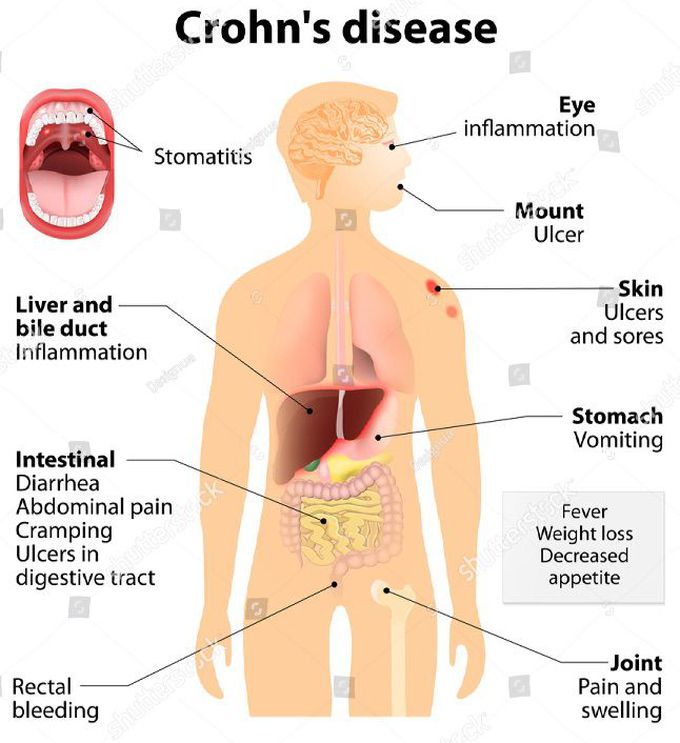

Crohn’s Disease
Crohn's disease is an inflammatory bowel disease (IBD). It causes inflammation of your digestive tract, which can lead to abdominal pain, severe diarrhea, fatigue, weight loss and malnutrition. Inflammation caused by Crohn's disease can involve different areas of the digestive tract in different people. The inflammation caused by Crohn's disease often spreads deep into the layers of affected bowel tissue. Crohn's disease can be both painful and debilitating, and sometimes may lead to life-threatening complications. Signs and symptoms of Crohn's disease can range from mild to severe. They usually develop gradually, but sometimes will come on suddenly, without warning. You may also have periods of time when you have no signs or symptoms (remission). When the disease is active, signs and symptoms may include: Diarrhea Fever Fatigue Abdominal pain and cramping Blood in your stool Mouth sores Reduced appetite and weight loss Pain or drainage near or around the anus due to inflammation from a tunnel into the skin (fistula). Inflammation of skin, eyes and joints Inflammation of the liver or bile ducts Delayed growth or sexual development, in children. number of factors, such as heredity and a malfunctioning immune system, likely play a role in its development: Immune system. It's possible that a virus or bacterium may trigger Crohn's disease. When your immune system tries to fight off the invading microorganism, an abnormal immune response causes the immune system to attack the cells in the digestive tract, too. Heredity. Crohn's is more common in people who have family members with the disease, so genes may play a role in making people more susceptible. However, most people with Crohn's disease don't have a family history of the disease. Risk factors for Crohn's disease may include: Age. Crohn's disease can occur at any age, but you're likely to develop the condition when you're young. Most people who develop Crohn's disease are diagnosed before they're around 30 years old. Ethnicity. Although Crohn's disease can affect any ethnic group, whites have the highest risk, including people of Eastern European (Ashkenazi) Jewish descent. However, the incidence of Crohn's disease is increasing among blacks who live in North America and the United Kingdom. Family history. You're at higher risk if you have a close relative, such as a parent, sibling or child, with the disease. As many as 1 in 5 people with Crohn's disease has a family member with the disease. Cigarette smoking. Cigarette smoking is the most important controllable risk factor for developing Crohn's disease. Smoking also leads to more-severe disease and a greater risk of having surgery. If you smoke, it's important to stop. Nonsteroidal anti-inflammatory medications. These include ibuprofen (Advil, Motrin IB, others), naproxen sodium (Aleve), diclofenac sodium (Voltaren) and others. While they do not cause Crohn's disease, they can lead to inflammation of the bowel that makes Crohn's disease worse. Where you live. If you live in an urban area or in an industrialized country, you're more likely to develop Crohn's disease. This suggests that environmental factors, including a diet high in fat or refined foods, may play a role in Crohn's disease.

